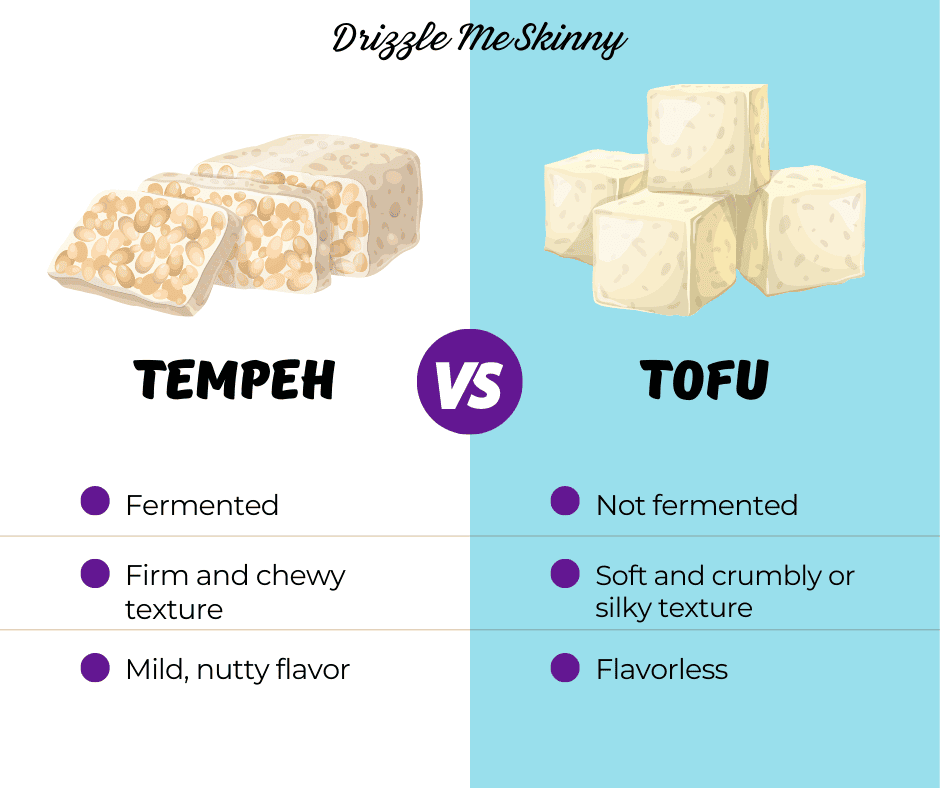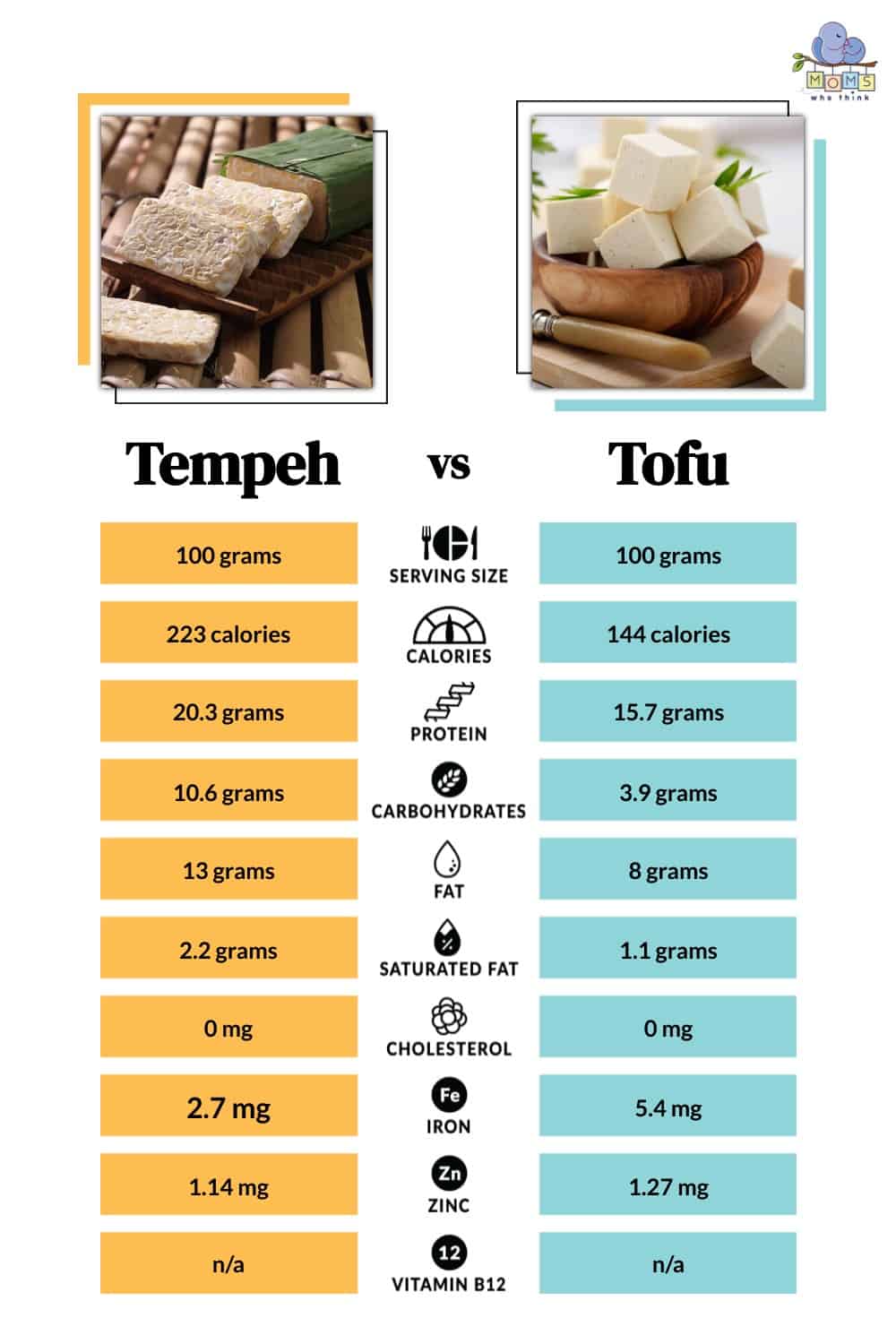Tofu and tempeh are popular plant-based proteins. Both offer unique nutritional benefits.
Tofu vs tempeh nutritional benefits, Comparing tofu and tempeh helps understand their nutritional value better. Each has its own advantages, making them suitable for different diets. This comparison will guide you in making informed choices for your meals. Discover the health benefits and nutritional facts of tofu and tempeh, and see which one suits your dietary needs.

Tempeh Vs Tofu Which is Healthier: The Ultimate Comparison
Tofu And Tempeh for Weight Loss: The Ultimate Protein Guide
What Is Tofu?
Tofu, made from soybeans, is a protein-rich food. It is often compared to tempeh for its nutritional benefits.
Tofu is a versatile plant-based protein. It is made from soybeans. People often call it bean curd. Tofu has a mild flavor and smooth texture. It easily takes on the taste of spices and sauces.
Production Process
Tofu production starts with soaking soybeans. The soaked beans are then ground with water. This mixture is boiled and filtered to get soy milk. Coagulants like calcium sulfate are added to the soy milk. This helps form curds. The curds are then pressed into blocks. These blocks are tofu. The firmness of tofu depends on how much water is pressed out.
Common Uses
Tofu is used in many dishes. It can be grilled, fried, or baked. People add it to soups, salads, and stir-fries. Tofu can also be blended into smoothies. It is a great meat substitute in many recipes. Tofu absorbs flavors well. So it pairs well with many sauces and marinades. “`
What Is Tempeh?
Tempeh is a traditional Indonesian food made from fermented soybeans. It has a firm texture and a nutty flavor. Tempeh is packed with protein and offers several health benefits. It is a versatile ingredient that can be used in many dishes.
Production Process
Tempeh production starts with whole soybeans. The soybeans are soaked, dehulled, and then cooked. After cooking, they are mixed with a starter culture, usually Rhizopus oligosporus. This culture helps the beans ferment. The mixture is then spread into a thin layer and left to ferment for about 24 to 48 hours at a warm temperature.
The fermentation process binds the soybeans into a compact cake. This process enhances the nutritional profile of the soybeans. The result is a dense, protein-rich food that is easy to digest.
Common Uses
Tempeh is popular in vegan and vegetarian diets. It can be used in a variety of dishes:
- Stir-fries
- Grilled or baked
- In salads
- As a meat substitute in sandwiches
- Marinated and sautéed
Tempeh absorbs flavors well, making it a versatile ingredient. It can be seasoned and cooked in many ways. This makes it a popular choice for those looking to add plant-based protein to their diet.
Nutritional Profile Of Tofu
Tofu offers a low-calorie, high-protein option with essential amino acids. It is rich in iron and calcium, ideal for bone health.
Tofu is a versatile and nutritious food. It is made from soybeans and is a staple in many diets worldwide. Tofu offers many health benefits, making it a popular choice for those seeking a balanced diet.
Macronutrients
Tofu is rich in protein. It contains about 10 grams of protein per 100 grams. This makes it an excellent source for vegetarians and vegans. Tofu is also low in fat. It contains around 5 grams of fat per 100 grams. Most of this fat is healthy unsaturated fat. Tofu is also low in carbohydrates, with only 2 grams per 100 grams. This makes it suitable for low-carb diets.
Vitamins And Minerals
Tofu is a good source of several essential vitamins and minerals. It contains calcium, which is vital for bone health. One serving of tofu can provide up to 20% of your daily calcium needs. Tofu also contains iron, important for making red blood cells. One serving of tofu provides about 15% of your daily iron needs. Tofu is also rich in magnesium, which supports muscle and nerve function. It contains small amounts of other vitamins like Vitamin B1 and Vitamin B6. These vitamins help with energy production and brain function. Tofu is a nutritious food that can support a healthy diet. It provides essential macronutrients, vitamins, and minerals. “`

Credit: drizzlemeskinny.com
Nutritional Profile Of Tempeh
Tempeh is a popular plant-based protein made from fermented soybeans. It is known for its dense texture and nutty flavor. But tempeh is not just delicious; it is also packed with nutrients. In this section, we will explore the nutritional profile of tempeh, including its macronutrients, vitamins, and minerals.
Macronutrients
Tempeh is rich in macronutrients that are essential for a balanced diet. Here’s a breakdown of its macronutrient content:
| Macronutrient | Amount per 100g |
|---|---|
| Protein | 19 grams |
| Fat | 11 grams |
| Carbohydrates | 9 grams |
| Fiber | 5 grams |
Tempeh offers a high amount of protein. This makes it a great meat substitute. It also contains healthy fats. These are good for your heart. The carbohydrates and fiber keep you full and aid digestion.
Vitamins And Minerals
Tempeh is also a good source of various vitamins and minerals. Here are some of the key nutrients found in tempeh:
- Calcium: Important for bone health.
- Iron: Essential for making red blood cells.
- Magnesium: Supports muscle and nerve function.
- Phosphorus: Helps build strong bones and teeth.
- Vitamin B2 (Riboflavin): Helps convert food into energy.
- Vitamin B3 (Niacin): Supports skin and nerve health.
Including tempeh in your diet can help you get these essential nutrients. It is a versatile and healthy addition to many meals.
Health Benefits Of Tofu
Tofu, made from soybeans, is a versatile and nutritious food. It’s packed with essential nutrients and offers numerous health benefits. Incorporating tofu into your diet can support your overall well-being. Let’s explore the health benefits of tofu.
Heart Health
Tofu is low in saturated fat and cholesterol-free. These qualities make it heart-friendly. Consuming tofu can help lower bad cholesterol levels. This reduces the risk of heart disease. Tofu also contains isoflavones. These compounds improve blood vessel function and reduce inflammation. Eating tofu regularly supports a healthy heart.
Bone Health
Tofu is an excellent source of calcium. Strong bones need calcium to stay healthy. Tofu also contains magnesium and phosphorus. These minerals are crucial for bone health. Regular tofu consumption can help prevent osteoporosis. This is especially important as we age. Tofu also contains protein, which supports muscle and bone strength. Including tofu in your diet can keep your bones strong.

Credit: www.momswhothink.com
Health Benefits Of Tempeh
Tempeh, a fermented soybean product, boasts numerous health benefits. It is rich in protein, vitamins, and minerals, making it a great addition to any diet. Let’s delve into some of the key health benefits of tempeh.
Digestive Health
Tempeh is excellent for digestive health. Its fermentation process creates probiotics. Probiotics are beneficial bacteria. They help maintain a healthy gut. A balanced gut flora aids digestion and nutrient absorption. Tempeh also contains dietary fiber. Fiber promotes regular bowel movements. It prevents constipation and supports overall gut health.
Bone Health
Bone health is crucial, and tempeh can help. It is a good source of calcium. Calcium is essential for strong bones and teeth. Tempeh also contains magnesium. Magnesium helps in calcium absorption. It supports bone density and strength. Additionally, tempeh has phosphorus. Phosphorus works with calcium to maintain bone health.
Which Is Healthier?
Tofu and tempeh are popular plant-based protein sources. Each offers unique nutritional benefits. But which one is healthier? Let’s dive into the details.
Nutrient Density Comparison
Tofu and tempeh both provide essential nutrients. Yet, they differ in nutrient density.
Tofu is made from soy milk. It is rich in protein and low in calories. A 100-gram serving of tofu offers:
- Protein: 8 grams
- Calories: 76
- Fat: 4.8 grams
- Carbs: 1.9 grams
- Calcium: 10% of the Daily Value (DV)
Tempeh is made from fermented soybeans. It is higher in protein and contains more fiber. A 100-gram serving of tempeh provides:
- Protein: 19 grams
- Calories: 193
- Fat: 11 grams
- Carbs: 7.6 grams
- Calcium: 11% of the DV
Tempeh contains more protein and fiber compared to tofu. Tofu has fewer calories and is lower in fat. Both are nutrient-dense, but they serve different dietary needs.
Personal Dietary Needs
Choosing tofu or tempeh depends on your dietary goals.
If you aim for higher protein intake, tempeh is a better choice. It offers more protein per serving. This can help in muscle building.
If you want a lower-calorie option, tofu is ideal. It has fewer calories and less fat. This makes it suitable for weight management.
For gut health, tempeh is beneficial. Its fermentation process introduces probiotics. These support a healthy digestive system.
If calcium intake is a priority, both are good options. They provide similar amounts of calcium per serving. This helps in maintaining bone health.
Consider food allergies or intolerances too. Some people may react differently to fermented products like tempeh.
In summary, both tofu and tempeh are healthy. Your choice depends on your specific nutritional needs and health goals.
Frequently Asked Questions
Is tempeh more healthy than tofu?
Both are healthy, but tempeh is often considered more nutrient-dense due to its higher protein, fiber, and probiotic content from fermentation. However, tofu is lower in calories and fat, making it better for certain diets.
Is tempeh good for weight loss?
Yes! Tempeh is high in protein and fiber, which promote satiety and help control appetite, making it a great option for weight loss.
Can I replace tempeh with tofu?
Yes, you can substitute tofu for tempeh in most recipes. Keep in mind that tofu is softer and milder in flavor, so the dish’s texture and taste might differ slightly.
What type of tofu is healthiest?
Firm or extra-firm tofu is often the healthiest choice. It contains more protein and fewer calories per serving compared to softer varieties and is less processed than silken tofu.
Is tempeh a superfood?
Tempeh is considered a superfood by many due to its nutrient density, high protein content, and gut-friendly probiotics from fermentation. It’s a versatile, plant-based powerhouse! 🌱
Conclusion
Tofu and tempeh both offer great nutritional benefits. Tofu is high in protein and low in fat. Tempeh provides more fiber and essential vitamins. Both fit well in a balanced diet. Choose based on your taste and texture preference. Tofu is softer, while tempeh is firmer.
Both can be versatile in recipes. Enjoy exploring these nutritious options!








